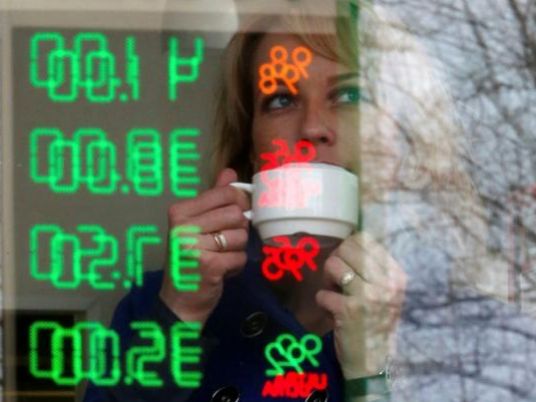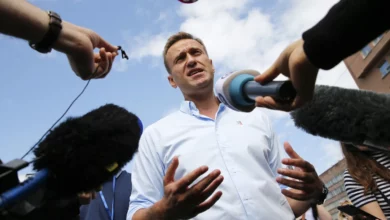
The global economic slowdown has hurt millions of households, but has at least had a silver lining: with oil prices falling, the cost of filling up a vehicle with fuel has dropped.
Except, that is, in Russia.
While in the past two years world oil prices have fallen 60 percent, the prices at the pump for gasoline in Russia — one of the world's biggest oil producers — have risen 11 percent.
A Reuters analysis of the pricing structure for Russian fuel has revealed a major reason for this anomaly: a large chunk of the savings that consumers would be making from lower world prices are instead being eaten up by the government in the form of higher taxes.
Fuel consumption is falling yet, according to Reuters calculations, the Russian state budget is on track to take in about 200 billion rubles ($3 billion) more in excise tax on fuel this year than it did last year.
That extra money is about 1.4 percent of projected budget revenues for this year, or roughly what it will cost the Kremlin to build a planned bridge connecting southern Russia to Crimea, the region it annexed from Ukraine.
In this way the Russian government, struggling with lower oil export income and Western sanctions, has been able to plug holes in the budget largely at the expense of motorists — but without the politically risky step of publicly raising taxes imposed directly on consumers, like sales tax.
The Russian finance ministry did not respond to questions submitted by Reuters.
The excise tax on fuel — which is levied as the product leaves refineries but is ultimately passed on to consumers — was raised in January this year, and then again in April. This has passed unnoticed among many people in Russia, both because it did not involve a direct tax on consumers and because the effect on pump prices was partly masked by the falling oil price.
Customers filling up their vehicles around Russia told Reuters they were exasperated that the fall in oil prices had not translated into cheaper fuel, but they were not aware of the role played by excise tax in keeping prices high.
"I still don't understand why the pump prices are going up when the oil price is so low," said a pensioner, who gave his name as Sergei, and was filling up his rusty Lada saloon at a fuel station in the Tver region, north of Russia, in June.
"Apparently, someone's doing well out of it."
Lost savings
The price at the pump in July this year of a liter of Ai-92 fuel, the most commonly-used grade in Russia, was 34.4 rubles. That was up 11 percent on July 2014, when the world old price started plummeting.
For comparison, over the same period in the United States, another major oil producer, the price of a liter of gasoline fell by 38 percent, broadly tracking the falling crude price.
Fuel excise tax is not the only reason Russian fuel has not grown cheaper. Wholesale prices for fuel on the domestic Russian market have gone up. That is because the government cut export duties for oil products. Under a formula designed to stop fuel draining from the domestic market when profits from exports are higher, the wholesale price went up accordingly.
However, the increase in excise taxes and associated taxes has made pump prices higher than they would be otherwise.
In 2015, before the duty was increased, excise tax and value added tax accounted for 9.1 rubles on the price of a liter of Ai-92 fuel, according to Reuters calculations.
By this year, the excise tax and value added tax accounted for 12.6 rubles on the price of a liter.
In an annex to the legislation which increased fuel duty in April, the ministry said that the increase would not hurt consumers because world oil prices were falling. It did not address the issue of the savings motorists would otherwise have made.
"The increase in the tax burden, leading to price rises for oil products on the territory of the Russian Federation, has canceled out the fall in oil prices," Russia's state anti-monopoly service says on its website.
Pain for consumers
The de facto tax at the fuel pump is, according to some economists, consistent with the way the Russian state has responded to the economic crisis as a whole: passing on much of the pain to ordinary people.
In particular, the authorities allowed the rouble currency to weaken. That helped balance the budget because it meant that dollar-denominated oil and gas revenues could stretch further in paying for rouble-denominated services. It also made Russian exporting companies more competitive.
However, it pushed up the price of consumer goods, many of which have to be imported. Inflation last year was 12.9 percent, while nominal wages rose very little.
Instead of blaming the government for the high fuel prices, some consumers view the oil companies as the villains.
"People are kind of angry," said Alexei, a fuel pump worker from Vladimir region, in central Russia, who did not give his full name because he is not authorized to speak to the media .
He said before the fall in world oil prices, he would on average earn between 200 and 250 rubles a day in tips from customers, for whom he would operate the pumps.
"Now it's nothing like that … recently one person pushed me away (and said): 'I'll fill it up myself'." He said the customer ended up spraying fuel over himself because he did not know how to operate the nozzle.
But fuel companies say they are not to blame.
Executives or owners at five gas station operators said their margins had been squeezed because they were paying more duty.
"The big companies can let their retail operations operate at zero (profit), or at a loss, for one year, or two," said Rustam Vishyankov, owner of a private chain of fuel stations in Vladimir region.
"We won't even last a few months. What am I going to pay my staff with?" he asked.




